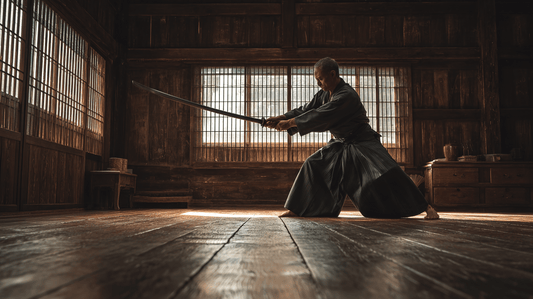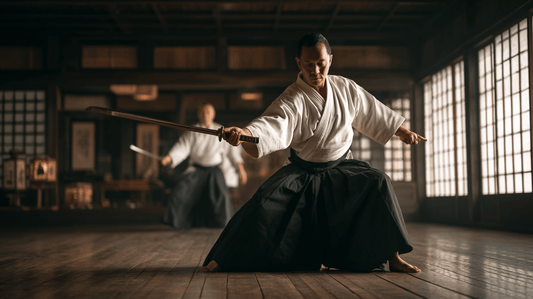Katana Techniques & Training

How to Safely Handle and Swing a Katana
Learning how to safely swing a katana is essential for martial artists, collectors, and enthusiasts alike. The katana is not just a decorative object—it's a real weapon that demands respect, proper grip, and technique. In this guide, we’ll walk you through the fundamentals of safe katana handling, offering key sword handling tips to avoid injury and improve control.
How to Safely Handle and Swing a Katana
Learning how to safely swing a katana is essential for martial artists, collectors, and enthusiasts alike. The katana is not just a decorative object—it's a real weapon that demands respect, proper grip, and technique. In this guide, we’ll walk you through the fundamentals of safe katana handling, offering key sword handling tips to avoid injury and improve control.

Katana Techniques: Basic Sword Moves for Beginners
Mastering katana techniques starts with learning foundational moves that build control, precision, and confidence. Whether you're drawn to the elegance of samurai sword training or inspired by anime heroes, understanding the basics is the first step in your martial arts journey. This guide introduces basic katana moves including grips, cuts, and stances for those new to sword martial arts basics. Getting Started: Choosing Your Practice Katana Before diving into techniques, it’s crucial to select a proper training katana. Beginners often start with a bokken (wooden sword) or an unsharpened steel katana to ensure safety and form focus. Explore beginner-friendly options like the Zenitsu Agatsuma Katana for practice or display. Check out our complete katana collection to find a sword suited to your training level and aesthetic preferences. Proper Grip and Stance Success in beginner sword techniques starts with a correct grip and stable stance. The katana is traditionally held with both hands—dominant hand near the guard (tsuba) and non-dominant hand near the pommel (kashira). Steps for a Proper Grip Hold the tsuka (handle) lightly but securely, allowing for wrist flexibility. Thumbs should face forward, and the grip should allow the blade to rotate slightly during cuts. Maintain a straight wrist alignment to prevent injury and enhance control. Basic Training Stance: Chudan-no-kamae This is the most balanced stance in sword arts: Stand with feet shoulder-width apart, left foot slightly behind the right. Keep the sword pointed at your opponent’s throat, elbows relaxed. Weight evenly distributed, with knees slightly bent for mobility. Fundamental Katana Cutting Techniques All katana techniques revolve around clean, deliberate cuts. Beginners should focus on mastering these four core movements: Kesa-giri: Diagonal cut from shoulder to opposite hip. Gyaku-kesa: Reverse diagonal cut, hip to opposite shoulder. Shomen-giri: Straight vertical cut from head to midline. Do-giri: Horizontal cut aimed at the torso. Each of these should be practiced slowly with emphasis on form, breathing, and footwork. Realistic training can be enhanced using well-balanced swords like the Tokyo Katana. Footwork and Movement Basics Efficient footwork enables fluid strikes and solid defense. In traditional Japanese swordsmanship, movement is just as important as the blade technique. Common Beginner Footwork Drills Tsugi-ashi: Sliding step to advance or retreat without losing stance. Okuri-ashi: Forward and backward movement maintaining alignment. Tai-sabaki: Body movement or pivot to evade and counterattack. Practice these in combination with basic cuts to develop a full-body awareness during samurai sword training. Training Drills for Beginners Consistent practice is key. Here are simple drills to reinforce your sword martial arts basics: Drill Purpose Recommended Reps Shomen Cut Repetition Improve blade alignment 20 reps/session Footwork & Cut Combo Integrate mobility and strike 10 reps each side Chudan-no-kamae Hold Build endurance and form stability 3 min hold Accessories to Improve Your Practice Investing in practical accessories enhances training efficiency and safety. Essentials include: Katana stands for safe storage. Sword cleaning kits to maintain blade quality. Wall mounts for easy access and display. Safety Tips for Beginner Katana Practice Respect for the weapon and tradition is central to all katana techniques. Follow these safety guidelines: Always practice in a clear, open space. Use wooden or unsharpened swords until you master control. Wear proper training attire and foot protection. Train under supervision or with guided videos if possible. Learn More About Katana and Sword Arts Continue exploring the world of swordsmanship with these valuable resources: Nippon.com – Guide to Kendo and Kenjutsu Sword Encyclopedia – Sword Techniques Overview Encyclopedia Britannica – Kendo Kendo World – YouTube Channel Conclusion: Begin Your Katana Training Journey Today Learning katana techniques introduces you to discipline, precision, and respect. Start your journey with foundational cuts, grips, and movements that define the art of the sword. Whether you're drawn by cultural passion or anime inspiration, your training begins with dedication to the basics. Browse beginner-friendly swords and training tools at Katana America to take the next step in your samurai sword training journey.
Katana Techniques: Basic Sword Moves for Beginners
Mastering katana techniques starts with learning foundational moves that build control, precision, and confidence. Whether you're drawn to the elegance of samurai sword training or inspired by anime heroes, understanding the basics is the first step in your martial arts journey. This guide introduces basic katana moves including grips, cuts, and stances for those new to sword martial arts basics. Getting Started: Choosing Your Practice Katana Before diving into techniques, it’s crucial to select a proper training katana. Beginners often start with a bokken (wooden sword) or an unsharpened steel katana to ensure safety and form focus. Explore beginner-friendly options like the Zenitsu Agatsuma Katana for practice or display. Check out our complete katana collection to find a sword suited to your training level and aesthetic preferences. Proper Grip and Stance Success in beginner sword techniques starts with a correct grip and stable stance. The katana is traditionally held with both hands—dominant hand near the guard (tsuba) and non-dominant hand near the pommel (kashira). Steps for a Proper Grip Hold the tsuka (handle) lightly but securely, allowing for wrist flexibility. Thumbs should face forward, and the grip should allow the blade to rotate slightly during cuts. Maintain a straight wrist alignment to prevent injury and enhance control. Basic Training Stance: Chudan-no-kamae This is the most balanced stance in sword arts: Stand with feet shoulder-width apart, left foot slightly behind the right. Keep the sword pointed at your opponent’s throat, elbows relaxed. Weight evenly distributed, with knees slightly bent for mobility. Fundamental Katana Cutting Techniques All katana techniques revolve around clean, deliberate cuts. Beginners should focus on mastering these four core movements: Kesa-giri: Diagonal cut from shoulder to opposite hip. Gyaku-kesa: Reverse diagonal cut, hip to opposite shoulder. Shomen-giri: Straight vertical cut from head to midline. Do-giri: Horizontal cut aimed at the torso. Each of these should be practiced slowly with emphasis on form, breathing, and footwork. Realistic training can be enhanced using well-balanced swords like the Tokyo Katana. Footwork and Movement Basics Efficient footwork enables fluid strikes and solid defense. In traditional Japanese swordsmanship, movement is just as important as the blade technique. Common Beginner Footwork Drills Tsugi-ashi: Sliding step to advance or retreat without losing stance. Okuri-ashi: Forward and backward movement maintaining alignment. Tai-sabaki: Body movement or pivot to evade and counterattack. Practice these in combination with basic cuts to develop a full-body awareness during samurai sword training. Training Drills for Beginners Consistent practice is key. Here are simple drills to reinforce your sword martial arts basics: Drill Purpose Recommended Reps Shomen Cut Repetition Improve blade alignment 20 reps/session Footwork & Cut Combo Integrate mobility and strike 10 reps each side Chudan-no-kamae Hold Build endurance and form stability 3 min hold Accessories to Improve Your Practice Investing in practical accessories enhances training efficiency and safety. Essentials include: Katana stands for safe storage. Sword cleaning kits to maintain blade quality. Wall mounts for easy access and display. Safety Tips for Beginner Katana Practice Respect for the weapon and tradition is central to all katana techniques. Follow these safety guidelines: Always practice in a clear, open space. Use wooden or unsharpened swords until you master control. Wear proper training attire and foot protection. Train under supervision or with guided videos if possible. Learn More About Katana and Sword Arts Continue exploring the world of swordsmanship with these valuable resources: Nippon.com – Guide to Kendo and Kenjutsu Sword Encyclopedia – Sword Techniques Overview Encyclopedia Britannica – Kendo Kendo World – YouTube Channel Conclusion: Begin Your Katana Training Journey Today Learning katana techniques introduces you to discipline, precision, and respect. Start your journey with foundational cuts, grips, and movements that define the art of the sword. Whether you're drawn by cultural passion or anime inspiration, your training begins with dedication to the basics. Browse beginner-friendly swords and training tools at Katana America to take the next step in your samurai sword training journey.
